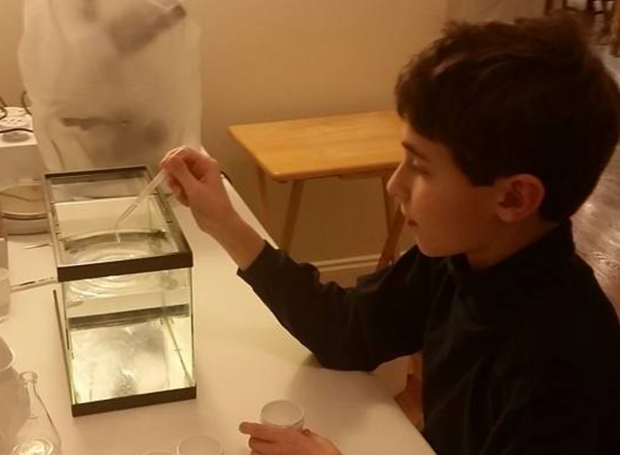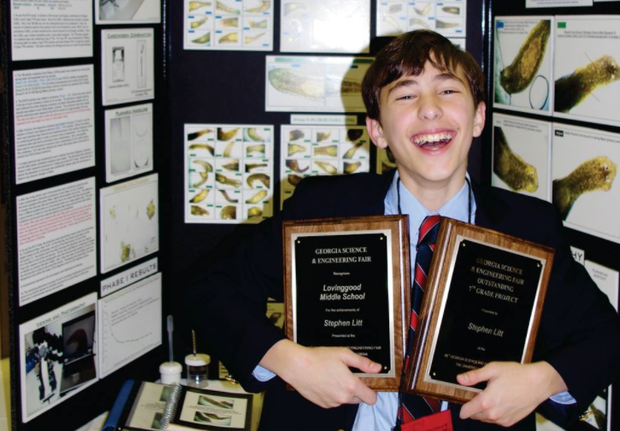Stephen Litt has been conducting science experiments since he was in first grade. Every year, the projects became more and more complicated — until finally, as a 7th grader, he came across something that gained national attention.
The 12-year-old boy from Marietta, Georgia, discovered evidence that chemicals in green tea may have cancer-fighting potential.

The Project
For this year’s science fair project, he tested epigallocatechin-3-gallate (EGCG), an antioxidant in green tea, to determine whether it could prevent breast cancer tumors in planaria, a type of flatworms.
The research, which was part of his award-winning project for the Georgia Science and Engineering Fair, earned the boy praise from scientists across the country. He was even invited to go on a private tour of the Allen Discovery Center at Tufts University while on spring break in Boston two weeks ago.
“It’s not a cure for cancer,” his father, Lesley Litt, who trained as a chemist and assisted with the project, told CBS News. “What he found is a way to prevent cancer in these worms from those specific carcinogens. Their DNA is not the same as humans, but a professor at Tufts and a few others, they want to know what’s going on — they want to help.”

How Did It Start?
Stephen was originally interested in researching the malaria virus after reading about it in class back in October.
“I said, ‘Uh, no, we can’t bring that stuff into the house — it’s dangerous,’” his father said.
Around that time, two close family friends were diagnosed with breast cancer. That’s when Stephen shifted his focus.
“He started reading about cancer, specifically breast cancer,” Litt explained. “He found an article about how the Japanese might have lower cancer rates because of green tea. He then read an article in Live Science about green tea’s anti-cancer secrets.”
The article noted that in Japan, where green tea consumption is high, prostate and breast cancer rates are about three times lower when compared with the United States, according to the World Health Organization, although many other factors may play a role.
Is there really a connection between green tea and fighting cancer? Stephen had to find out.
So the boy, with help from his father, set up a lab in his house. Stephen ordered 100 planaria, which he divided into 4 groups. Each group was exposed to a different substance over the course of four weeks.
The Experiment
One group was exposed to EGCG; the second group was exposed to EGCG for 24 hours and then two carcinogens (Stephen’s dad handled the hazardous stuff); the third group was exposed to the two types of carcinogens; and the fourth — as a control group — was only exposed to spring water.
Carefully, Stephen studied the changes the worms experienced, documenting every tumor grown over the month-long period. By the end of the experiment, Stephen determined that the worms exposed to EGCG and carcinogens didn’t grow any tumors, proving the antioxidant may actually help fight cancer growth in worm cells.
“We’re very far off from finding a cure for humans,” Litt clarified. “But this really does advance the research and give us more insight into what’s going on with human cancer cells.”
What Comes Next?
Next year, he’s hoping to get a better microscope and hopes to transplant real breast cancer tissue into these worms.
“He could use another year or two, hopefully at a unviersity lab,” said Litt, explaining that his future research will become more complicated.
In the mean time, Stephen has plenty to keep him busy. Not only is he a straight-A student, he’s a Boy Scout, working on becoming a black belt in karate, he plays tennis, and he’s one of the top oboe players in the state.
“Sometimes he even has time to play on his computer,” Litt said.
His parents couldn’t be more proud of the aspiring chemical engineer, especially with his most recent science experiment.
http://www.cbsnews.com/news/this-7th-grader-is-fighting-cancer-with-green-tea-and-getting-results/

Hi! I am a robot. I just upvoted you! I found similar content that readers might be interested in:
http://www.cbsnews.com/news/this-7th-grader-is-fighting-cancer-with-green-tea-and-getting-results/
You've had plenty of warning so before you get automatically downvoted or your reputation score falls below 0, I want to illustrate why so many of your posts are downvoted:
The post here, copying all the text, is copying too much. Same for posts like these:
https://steemit.com/science/@alexjonescentral/this-alien-worm-creature-will-haunt-your-nightmares
Furthermore, copy/pasted posts that give no attribution at all means you're plagiarizing them. Like these:
https://steemit.com/food/@alexjonescentral/review-every-food-lover-in-chicago-should-visit-entente https://steemit.com/food/@alexjonescentral/restaurant-review-love-food-central-s-vegan-gluten-free-fare-is-flat-out-great
Plagiarism is not tolerated.
Here are a few of your posts that only include a small, fair use amount of text and a link to the original article or video. The only suggestion I would make is to add quotation marks to make it more clear you are quoting the source, when you are. If you want to share something from the web, this is the way to do it!
https://steemit.com/news/@alexjonescentral/facebook-shuts-down-pro-le-pen-posts-as-french-election-nears https://steemit.com/life/@alexjonescentral/8-month-old-baby-weighing-38-pounds-baffles-doctors https://steemit.com/technology/@alexjonescentral/want-to-join-a-drone-racing-team
Congratulations @alexjonescentral! You received a personal award!
You can view your badges on your Steem Board and compare to others on the Steem Ranking
Do not miss the last post from @steemitboard:
Vote for @Steemitboard as a witness to get one more award and increased upvotes!